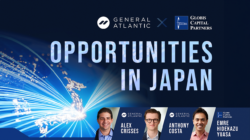Leading High Performing Remote Teams
How can leaders ensure that performance remains high in remote or hybrid-work environments?
Content Marketing
In this course, you’ll learn how compelling blogs, videos, podcasts, and other media can reach customers and drive sales. You’ll also learn steps for creating an effective content marketing plan, and some important ways to measure its impact and success.
Content marketing is a essential digital marketing strategy for companies looking to provide relevant and useful information to support your community and attract new customers.
Get started on your content marketing journey today.
Sustainable Innovation in Times of Disruption: Choices for a Better Society
There are opportunities for progress all around us. The key is to innovate on these opportunities sustainably.
To help identify most effective path forward, you'll need to gain a global perspective to these challenges in an open discussion. How can Japan and the world take action to create a more sustainable, innovative world? Where do you fit in?
It's time to find out.
Social Media & Digital Communications: Impact on Global Public Opinion
Social and digital media have dominated the communications industry for decades. But it's no secret that social media has the power to sway public opinion, and the way in which many companies use these platforms could be seen as manipulative.
What do companies need to be aware of when utilizing social and digital media? How can these mediums be used to better communicate strategically with the world?
Discover what top media and communications experts have to say.
CAGE Distance Framework
Want to expand overseas? The CAGE distance framework can help ensure you're constructing a solid global strategy in four areas: cultural, administrative, economic, and geographic. Learn how to leverage useful differences between countries, identify potential obstacles, and achieve global business success.
Servant Leadership
There's more to leadership than driving a team to profit. In fact, there's a word for looking beyond self-interest to prioritize individual growth: servant leadership. Try this course for a quick breakdown of what that is, how it works, and how it can lead to organizational success.
Strategy: Creating Value Inside Your Company
Have you ever wondered why certain companies are more successful than others? The answer is strategy: internal processes that control costs, allocate resources, and create value. This course from GLOBIS Unlimited can give you the tools you need for that strategic edge.
Strategy: Understanding the External Environment
To plan strategy on any level, you need to understand your company's external environment. In fact, your level of understanding can impact hiring, budgeting, marketing, or nearly any other part of the business world. Want to learn how to do all that? This course from GLOBIS Unlimited is the perfect first step!
Using Japanese Values to Thrive in Global Business
Japanese companies have unique cultural, communication, and operational challenges. But they also have values that have led to remarkable longevity. Check out this seminar to hear how these values help earn trust from overseas head offices and develop employees.
Marketing: Reaching Your Target
Every company works hard to get its products into the hands of customers. Are you doing everything you can to compete? In this course, you’ll find a winning formula to turn a product idea into real sales. Follow along through the fundamentals of the marketing mix and see how companies successfully bring products to market.
Basic Accounting: Financial Analysis
Want to compare your performance vs. a competitor? Or evaluate a potential vendor? Then you'll need to conduct a financial analysis. This course will teach you how to use three financial statements and evaluate financial performance in terms of profitability, efficiency, soundness, growth, and overall strength.
Career Anchors
What drives you to be good at your job?
Career anchors are based on your values, desires, motivations, and abilities. They are the immovable parts of your professional self-image that guide you throughout your career journey.
Try this short GLOBIS Unlimited course to identify which of the eight career anchors is yours!
Leadership with Passion through Kokorozashi
The key ingredient to success? Passion.
Finding your kokorozashi will unify your passions and skills to create positive change in society. This GLOBIS Unlimited course will help you develop the values and lifelong goals you need to become a strong, passion-driven leader.
Brain scientist Dr. Kenichiro Mogi shares insights on how the brain deals with stress during quarantine and how we can remain productive in these difficult times.
—
Transcript:
How should we cope with change during the pandemic?
When you look at the human brain using different kinds of data, it’s really fascinating. The brain adapts to new situations very quickly, so after an initial stimulus the response gets smaller and smaller with each additional stimulus. The brain gets used to the new situation. That helps us adapt to change. So even though it may seem baseless, we should be confident that our brains can adapt to this new situation.
And of course the pandemic has produced innovations, like teleworking and so forth. We’ve all seen how demand for food delivery has exploded. And the way we think about education is changing too. Instead of everyone learning the same thing together in the classroom, even elementary and middle schools are trying new approaches like distance learning, project-based learning, and active learning.
These innovations are starting to take root even in Japan. There’s an idea called “accelerationism” that says the faster a system gets pushed to its limits, the sooner a new system will emerge to replace it. In a sense, we’re seeing positive example of accelerationism. Changes that should have happened in Japan already are happening in response to the pandemic.
The key thing for your brain in a situation like this is to enjoy the process of change, to embrace the uncertainty that goes with it. There are pathways in our brain that can do this. Take fourteenth-century Europe. The Renaissance began in Florence. After a pandemic there comes a renaissance, a time of cultural innovation when human potential flourishes.
When something like this happens, old certainties can fall away and people start to see what’s most important. Like what does it mean to live? Or what’s the true mission of a business? What are the values we want to promote in society? It’s an opportunity for our brains to grow. If you’re feeling stressed out or frustrated, the best thing you can do is draw a line between the things you can control and the things you can’t, and to focus your efforts on the things you can control without getting anxious about the rest. If we can do that, I’m certain that when this is all over there will be a renaissance in Japan and the world.
What’s your advice for being productive while working from home?
Talking with my friends in creative fields and academia, it’s the people who work most effectively in normal times who are coping the best now. The people who always have a to do list in their minds-Most of my friends are busy people, who meet with people all day
and go out every evening. When that suddenly disappears, the external to-do list disappears with it. Now is a time when we have to make our own to-do lists.
And this is the big division now, between people who can do that, and people who can’t. People who can’t do it tend to work by responding to external requests as they come in. But the most creative and productive people make their own lists and prioritize each item. Then they can build in breaks to go to the convenience store or whatever they need to do to refresh themselves.
The crucial thing is to be able to work autonomously and manage your time and your working environment. It’s a kind of stress test for people’s way of working, for whether they can enjoy this environment where they’re scheduling and managing their own work.
Are there any upsides to isolation?
Normally, in business or school or social life, we value the connections we make with the people around us. But there is another side to work, an internal side, where we can look inside ourselves and strengthen our foundations. This situation can be a chance for brain growth, a chance to come up with new ideas, to access information that’s normally stuck in our temporal lobes and to connect the dots, as Steve Jobs said, so we can be more creative.
I think this period might produce new ideas and innovations that will change Japan and change the world. It’s important to see the bright side.
—
Video Adapted from「ピンチをチャンスに脳を成長させる方法」by 知見録


